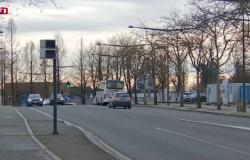
Can one François Bayrou hide another? Monday, December 16 in the evening, the brand new Prime Minister was not content with a highly criticized return to Béarn, only on the occasion of the Pau municipal council. At the same time, in Oloron, it is the name of the new tenant of Matignon, who has also been invited into all the conversations. Not without a small dose of opportunism.
A few hours before the end of the consultation prior to the project to reopen the Pau-Canfranc line, the surprise appointment of the almost local of the stage has thus revived the solid hopes of a definitive “yes” to the reopening of the line railed through the Pyrenean massif. “With him, we are saved”, “if he could push the issue a little…”, launched this Monday evening some Haut Béarnais, gathered in numbers in the Palas room. A hint of motivation which did not seem necessary for those in favor of reopening, on the occasion of the last public prior consultation meeting.
First lifts
“It’s an ambitious project. But this is not a project of unknown complexity. We know how to do it, and we have perfectly mastered systems elsewhere in the region which guarantee the safety of such a project. » Reassure, again, this is what Matthieu Chabanel tried to do on Monday evening. The CEO of SNCF Réseau represented the project owner. In particular, he had to answer questions related to the feasibility and safety of the redevelopment, which often came up during the three months of prospecting.
The first feedback from the preliminary consultation was presented to the project stakeholders during the closing meeting this Monday, December 16 in Oloron.
B. M.
Safety therefore, but also economic benefits, environmental impacts… After more than 500 contributions recorded, 12 meetings, 822 people met and 4,613 documents distributed, the public consultation is coming to an end. It must officially close this Friday, December 20, at midnight. Although voluntary, the latter is necessary to submit a file and obtain a declaration of public utility, obligatory to begin the work.
Rousset the Aragonese
Alain Rousset also made the trip to Oloron-Sainte-Marie this Monday. And it must be admitted that the project has become emblematic – not to say very personal – in the eyes of the president of the Nouvelle-Aquitaine Region. Already in 2016, he had made the resumption of traffic on the Oloron-Bedous portion a priority, for 122 million euros. As for the future of the last 33 kilometers to be redeveloped up to the Somport tunnel, the socialist tirelessly reiterates his ambitions and leaves little room for suspense. An “old dream”, “almost a duty to remember”, he says, hoping to once again be able to connect France and Spain by train via the Aspe valley.
“I know there are doubts in the valley. Will Alain Rousset succeed in reopening this path? Well yes ma’am, he will succeed! » In a flight into the first person, the President of the Region has sometimes lost patience with the arguments of the antis, the latter praises a “collective project”, to the detriment of “personal cases that we have resolved”. Jorge Azcon Navarro, his counterpart president of the government of Aragon was also present. And the presence of this trans-Pyrenean neighbor has also illustrated some concerns, which the three months of consultations have also made it possible to identify: “We are only doing it for Spain”, “we will not benefit from anything”, are regular concerns. certain contributors in the first conclusions presented.
The Bayrou cartridge?
On this heated issue, the mayor of Pau had already been contacted before his appointment as Prime Minister. In the midst of public consultation, EELV executives in Béarn intended in particular to broaden the debate to the Pau metropolitan area. Last October, they appealed to his hat as president of the agglomeration and to his Parisian networks: “We would like a little letter from Michel Barnier for Pau-Canfranc”, laughed the regional councilor and elected official from Pau, Jean. -Francois Blanco. Perhaps far from imagining the new name of Matignon’s successor.
So will the new head of government put the file at the top of the pile? And is it really necessary? The French State does not participate in financing the line, which should, if validated, rely on a European economic interest group (EEIG), organized around the Nouvelle-Aquitaine region. It brings together the government of Aragon, the French Ministry of Ecological Transition and the Spanish Ministry of Transport. For this cross-border project, 55% of the total amount is expected from the European Union.





